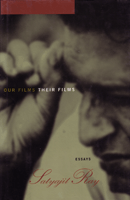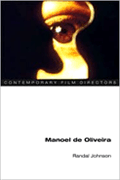Our Films, Their Films is a collection of perceptive, contemplative, and illuminating critical essays and personal memoirs by seminal filmmaker, composer, artist, author, intellectual, and cinephile, Satyajit Ray. Arranged into the two titular sections, Ray’s terse, candid, and often thematically overlapping expositions on Indian and international cinema reveal, not only profound engagement with, and sensitivity […]
Tag: Film Criticism
Nothing Happens: Chantal Akerman’s Hyperrealist Everyday by Ivone Margulies
In Nothing Happens: Chantal Akerman’s Hyperrealist Everyday, Ivone Margulies provides a comprehensive examination of the minimalist visual imagery, deliberate pacing, and recurrent themes of disconnection, wanderlust, isolation, and longing that define Akerman’s intensely personal cinema. Citing Akerman’s penchant for filming the rhythm of everyday life, and her de-emphasis of unique and significant events, Margulies proposes […]
Nelson Pereira dos Santos by Darlene J. Sadlier
With Nelson Pereira dos Santos’s body of work deeply rooted in an aesthetic as well as political and social consciousness, it is not surprising that Darlene J. Sadlier analyzes the trajectory of dos Santos’s cinema through a similar paradigmatic approach of integrating film form with historical context. Brought up in a middle-class, cinephile household in […]
My Years With Apu, A Memoir by Satyajit Ray
My Years With Apu, A Memoir reflects the lucidity, compassion, and humility of the versatile and immensely talented humanist filmmaker, Satyajit Ray. The book is prefaced by his wife, Bijoya Ray, who describes her attempts to faithfully recapture Ray’s memoir from his first draft, after his final draft was stolen at a hospital shortly before […]
Manoel de Oliveira by Randal Johnson
In Manoel de Oliveira, Randal Johnson’s comprehensive and informative critical evaluation of the Portuguese filmmaker’s body of work for the Contemporary Film Directors series, Johnson insightfully points out that the first 43 years of Oliveira’s film career coincides with the repressive, right wing regime of António de Oliveira Salazar and Estado Novo, an era of […]
The Last Modernist: The Films of Theo Angelopoulos, edited by Andrew Horton
Consisting of a series of critical essays and Andrew Horton’s interview on the distinctive imagery, cultural influences, and the filmmaker’s own personal, spiritual, and intellectual preoccupations, The Last Modernist: The Films of Theo Angelopoulos presents a diverse, insightful, and comprehensive examination into the dynamic framework that innately characterizes and forms the indefinable substance of Theo […]





